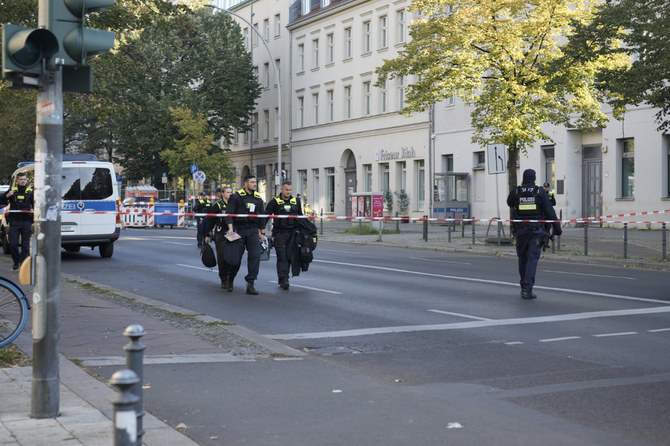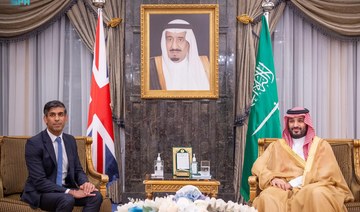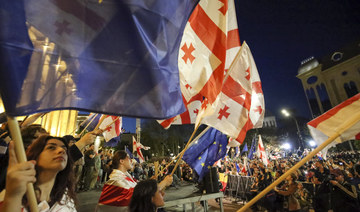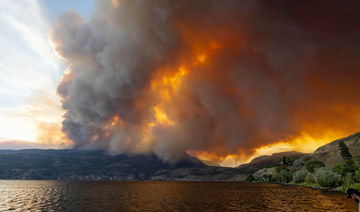BRUSSELS: The European Union began taking steps on Thursday to limit the impact of the war between Israel and Hamas on the bloc, amid heightened security tensions after a firebomb attack on a Berlin synagogue and killings in Belgium and France by suspected Islamic extremists.
Spain, which currently holds the EU’s rotating presidency, activated a crisis mechanism to speed up decision-making and coordination between the 27 member countries, the bloc’s institutions and major partners like the United Nations or the United States.
Officials from across the EU have expressed concerns about a rise in antisemitic attacks, radicalization online, the use of encrypted messaging services by extremists, and the need to speed up the deportation of people who might pose a public danger.
But calls for an increase in security across the board are creating deep unease as the solutions being discussed could undermine free movement and the right to assemble in Europe.
Italy is introducing border checks to counter a possible rise in tensions over the Israel-Hamas war. Denmark and Sweden are too, due to what they have said is a terrorist threat. France intends to keep checks in place until at least May 2024, citing “new terrorist threats and external borders situation.”
More police have been deployed in Belgium, France and Germany.
EU foreign policy chief Josep Borrell believes part of the solution to Europe’s security woes must involve the bloc helping diplomatically and financially to bring an end to years of conflict between Israel and the Palestinians.
“We have learned from history that the most difficult decisions are always taken when we are on the edge of the abyss. I believe that is where we are now: on the edge of the abyss,” Borrell told EU lawmakers on Wednesday.
“When I hear Muslim religious authorities speaking the language of inter-religious conflict and explicitly stating that Europe is a party to this conflict, I feel that the storm clouds are looming,” he said.
Still, not all of Europe’s challenges are directly linked to the war.
Earlier on Thursday, Sweden hosted a meeting of ministers from eight countries, among them Germany, Belgium and France, focused on how to handle incidents where people burn the Muslim holy book, the Qur’an.
Prosecutors are trying to establish whether that was a key motive for a Tunisian man to shoot three Swedes in Brussels on Monday, killing two of them, ahead of a Belgium-Sweden soccer match in the capital.
While the Qur’an burnings are not directly linked to the conflict between Israel and Hamas, they are a sign of rising tensions between religious and other communities in Europe.
The war that began Oct. 7 has become the deadliest of five Gaza wars for both sides. More than 5,000 people have been killed in Israel and Gaza. Nearly 12,500 Palestinians have been wounded, and over 200 people in Israel taken hostage.
“We have to address multiple impacts from the continuing crisis in the Middle East” in the EU, European Commission Vice President Margaritis Schinas said.
“This entails the protection of our Jewish communities, but also the protection against a generalized climate of Islamophobia that has no place in our society,” he told reporters in Luxembourg, where EU interior ministers were meeting.
Pro-Palestinian rallies have been held in several European cities since the war. France has banned them. Germany has also promised to take tougher action against Hamas, which is already on the EU’s list of terrorist organizations.
Chancellor Olaf Scholz told the German parliament that local authorities “must not allow gatherings … at which it must be feared that antisemitic slogans will be shouted, that people’s deaths will be glorified and everything we can’t accept here.”
In France, the Palace of Versailles — a major tourist attraction — and three airports were evacuated for security reasons and temporarily closed Wednesday. The incidents were the latest in a spate of evacuations in the past five days, and the French government is threatening to fine or jail prank callers.
They followed the killing of a teacher in northern France on Friday by a suspected Islamic extremist.
French Interior Minister Gerland Darmanin noted that two foreigners were behind the recent attacks in Belgium and France, and he insisted that long-delayed reforms of EU asylum rules must be put in place.
Europe must “manage our borders, register people and conduct the security interviews that are necessary before every asylum request,” he told reporters.
The EU has agreements with Turkiye and Tunisia to persuade them to prevent migrants reaching Europe — and take them back if they do get through — but they are not working well. Other deals, with Egypt notably, are planned. Only around one in four people refused entry ever return home.
EU seeks answers to rising security challenges as Israel-Hamas war fuels new concerns
https://arab.news/6c87y
EU seeks answers to rising security challenges as Israel-Hamas war fuels new concerns

- Amid concerns over a rise in antisemitic attacks, officials from across the EU want to speed up deportation of people who might pose a public danger
- EU foreign policy chief says the bloc must also help diplomatically and financially to bring an end to years of conflict between Israel and the Palestinians
Two Americans, one Russian citizen among 20 detained in Georgia, Russia’s TASS reports

- 20 people detained at protests in Tbilisi while Georgian lawmakers were debating a “foreign agents” bill
Tbilisi: Some 1,000 protesters stood firm outside parliament in Georgia on Monday, vowing not to back down in their fight against a Russia-styled “foreign agent” bill, a day before it’s due to be adopted.
Protests have gripped the small Caucasus nation for weeks over the bill, which critics say will erode democracy and derail the ex-Soviet republic’s long-held ambition of joining the European Union.
Critics say the measure, which resembles one Russia has used to crack down on dissent, will steer Tbilisi back under Moscow’s influence.
The ruling Georgian Dream party has portrayed it as necessary for Georgia’s sovereignty, saying it will boost transparency of civil groups’ funding.
The bill is due to go for a third and final reading in parliament on Tuesday.
On Monday, it passed a committee vote, a final step before it goes for a vote in parliament.
The bill targets NGOs that receive foreign funding, with Georgian Dream’s billionaire backer Bidzina Ivanishvili accusing them of working on foreign orders and plotting a revolution.
Part of Tbilisi’s main Rustaveli Avenue was closed off around parliament on Monday.
Hundreds of riot police officers lined a street behind parliament, and some scuffles broke out between them and protesters.
Authorities a day earlier warned that they would arrest people who blocked parliament, but thousands defied the warning and came to the parliament’s gates anyway.
“We are planning to stay here for as long as it takes,” 22-year-old Mariam Kalandadze told AFP.
“This law means not joining Europe,” she said, adding that “this is something that I have wanted my whole life.”
Russia downs 16 Ukraine-launched missiles, 31 drones

- Russian defense ministry: 12 guided missiles were launched from a Ukrainian Vilkha multiple rocket launcher
- Four Storm Shadow aircraft guided missiles and seven drones were downed over Crimea
The Russian defense ministry said on Monday its air defense systems destroyed 16 missiles and 31 drones that Ukraine launched at Russian territory overnight, including 12 missiles over the battered border region of Belgorod.
Five houses were damaged in Belgorod, but according to preliminary information, there were no injuries, Governor Vyacheslav Gladkov wrote on the Telegram messaging app.
On Sunday, 15 people were killed in Belgorod when a section of an apartment block collapsed after being struck by fragments of a Soviet-era missile, launched by Ukraine and shot down by Russian forces, Russia said.
The Russian defense ministry said on Monday the 12 guided missiles were launched from a Ukrainian Vilkha multiple rocket launcher.
The ministry also said four Storm Shadow aircraft guided missiles and seven drones were downed over Crimea, eight drones were destroyed over the Kursk region and four were intercepted over the Lipetsk region.
A drone sparked a short-lived fire at an electrical substation in the Kursk region, Igor Artamonov, the governor of the region in Russia’s south, wrote on Telegram.
“There are no casualties. The fire in the territory of the electrical substation is being extinguished,” Artamonov said.
Reuters could not independently verify the reports.
There was no immediate comment from Ukraine. Kyiv says that targeting Russia’s military, transport and energy infrastructure undermines Moscow’s war effort and is an answer to the countless deadly attacks by Russia.
Western Canada blazes cause evacuations, air quality concerns

- Authorities issued an evacuation order for a community in British Columbia and warn of poor air quality across provinces
TORONTO: The season’s first major wildfires have spread to roughly 10,000 hectares across Western Canada on Sunday as authorities issued an evacuation order for a community in British Columbia and warned of poor air quality across provinces.
In British Columbia, thousands of residents in Northern Rockies Regional Municipality and Fort Nelson First Nations were evacuated as the nearby blaze nearly doubled to 4,136 hectares.
Northern Rockies Regional Municipality Mayor Rob Fraser in a TV interview said most of the 3,500 residents in and around Fort Nelson had been evacuated.
Fort Nelson First Nation, seven kilometers from the town, also issued an evacuation order for Fontas, an Indigenous community.
Across the border in Alberta, residents of Fort McMurray, an oil hub which suffered extensive damage from wildfires in 2016, were asked to prepare to leave.
However, by the end of the day, favorable weather helped by a shower forecast tamed fire growth at Fort McMurray. Authorities said they expected fire activity to remain low with more showers expected on Monday.
Alberta continued to stress the two wildfires were extreme and out of control and recorded 43 active fires, including one located 16km southwest of Fort McMurray. By Sunday, authorities revised the area affected by fire to 6,579 hectares, much larger than what was reported on Friday.
Fraser said the fire was started by a tree blown down by strong winds falling onto a power line.
Six crews of wildland firefighters, 13 helicopters and airtankers were taming the fire on Sunday, said Alberta authorities.
Evacuation alerts were in place for Fort McMurray, Saprae Creek Estates and expanded to Gregoire Lake Estates and Rickards Landing Industrial Park.
Although there is no immediate risk to these communities, the alert ensures residents are prepared to evacuate if conditions change.
Smoke in Fort McMurray on Saturday was coming from fires in northern British Columbia, Alberta said.
Environment Canada issued a special air quality statement that extends from British Columbia to Ontario on Sunday.
Last year, a veil of smoke blanketed the US East Coast, tinging the skies a fluorescent orange as smoke reached parts of Europe as hundreds of forest fires burnt millions of acres of land and forced about 120,000 people to leave their homes.
The federal government has warned Canada faces another “catastrophic” wildfire season as it forecast higher-than-normal spring and summer temperatures across much of the country, boosted by El Nino weather conditions.
Canada experienced one of its warmest winters with low to non-existent snow in many areas, raising fears ahead of a hot summer triggering blazes in forests and wildlands amid an ongoing drought.
India to sign 10-year pact with Iran for Chabahar port management— report

- India has been developing port to transport goods to Iran, Afghanistan and Central Asia to avoid Karachi
- Sanctions imposed by Washington on Iran have slowed down Chabahar port’s development work
NEW DELHI: India is likely to sign an agreement with Iran on Monday to manage the southeastern Iranian port of Chabahar for the next 10 years, the Economic Times reported.
India Shipping Minister Sarbananda Sonowal is likely to travel to Iran to sign the agreement, the report said, citing unidentified sources.
The Indian government did not immediately respond to a request for comment.
India has been developing a part of the port in Chabahar, which is located on Iran’s southeastern coast along the Gulf of Oman, as a way to transport goods to Iran, Afghanistan and central Asian countries that avoids the port of Karachi in its rival Pakistan.
US sanctions on Iran, however, have slowed down the port’s development.
India vote to resume with Kashmir poised to oppose Modi

- Jammu and Kashmir has deeply resented Modi government’s 2019 snap decision to bring territory under its control
- Rebel groups opposed to Indian rule have waged an insurgency since 1989 on frontier controlled by New Delhi
SRINAGAR, India: India’s six-week election is set to resume Monday including in Kashmir, where voters are expected to show their discontent with dramatic changes in the disputed territory under Prime Minister Narendra Modi’s government.
Modi remains popular across much of India and his Hindu-nationalist Bharatiya Janata Party (BJP) is widely expected to win the poll when it concludes early next month.
But his government’s snap decision in 2019 to bring Kashmir under direct rule by New Delhi — and the drastic security clampdown that accompanied it — have been deeply resented among the region’s residents, who will be voting for the first time since the move.
“What we’re telling voters now is that you have to make your voice heard,” said former chief minister Omar Abdullah, whose National Conference party is campaigning for the restoration of Kashmir’s former semi-autonomy.
“The point of view that we want people to send out is that what happened... is not acceptable to them,” he told AFP.
Kashmir has been divided between India and Pakistan since their independence in 1947. Both claim it in full and have fought two wars over control of the Himalayan region.
Rebel groups opposed to Indian rule have waged an insurgency since 1989 on the side of the frontier controlled by New Delhi, demanding either independence or a merger with Pakistan.
The conflict has killed tens of thousands of soldiers, rebels and civilians in the decades since, including a spate of firefights between suspected rebels and security forces in the past month.
Violence has dwindled since the Indian portion of the territory was brought under direct rule five years ago, a move that saw the mass arrest of local political leaders and a months-long telecommunications blackout to forestall expected protests.
Modi’s government says its canceling of Kashmir’s special status has brought “peace and development,” and it has consistently claimed the move was supported by Kashmiris.
But his party has not fielded any candidates in the Kashmir valley for the first time since 1996, and experts say the BJP would have been roundly defeated if it had.
“They would lose, simple as that,” political analyst and historian Sidiq Wahid told AFP last week.
The BJP has appealed to voters to instead support smaller and newly created parties that have publicly aligned with Modi’s policies.
But voters are expected to back one of two established Kashmiri political parties calling for the Modi government’s changes to be reversed.
India’s election is conducted in seven phases over six weeks to ease the immense logistical burden of staging the democratic exercise in the world’s most populous country.
More than 968 million people are eligible to vote in India’s election, with the final round of polling on June 1 and results expected three days later.
Turnout so far has declined significantly from the last national poll in 2019, according to election commission figures.
Analysts have blamed widespread expectations that Modi will easily win a third term and hotter-than-average temperatures heading into the summer.
India’s weather bureau has forecast more hot spells in May and the election commission formed a taskforce last month to review the impact of heat and humidity before each round of voting.


















